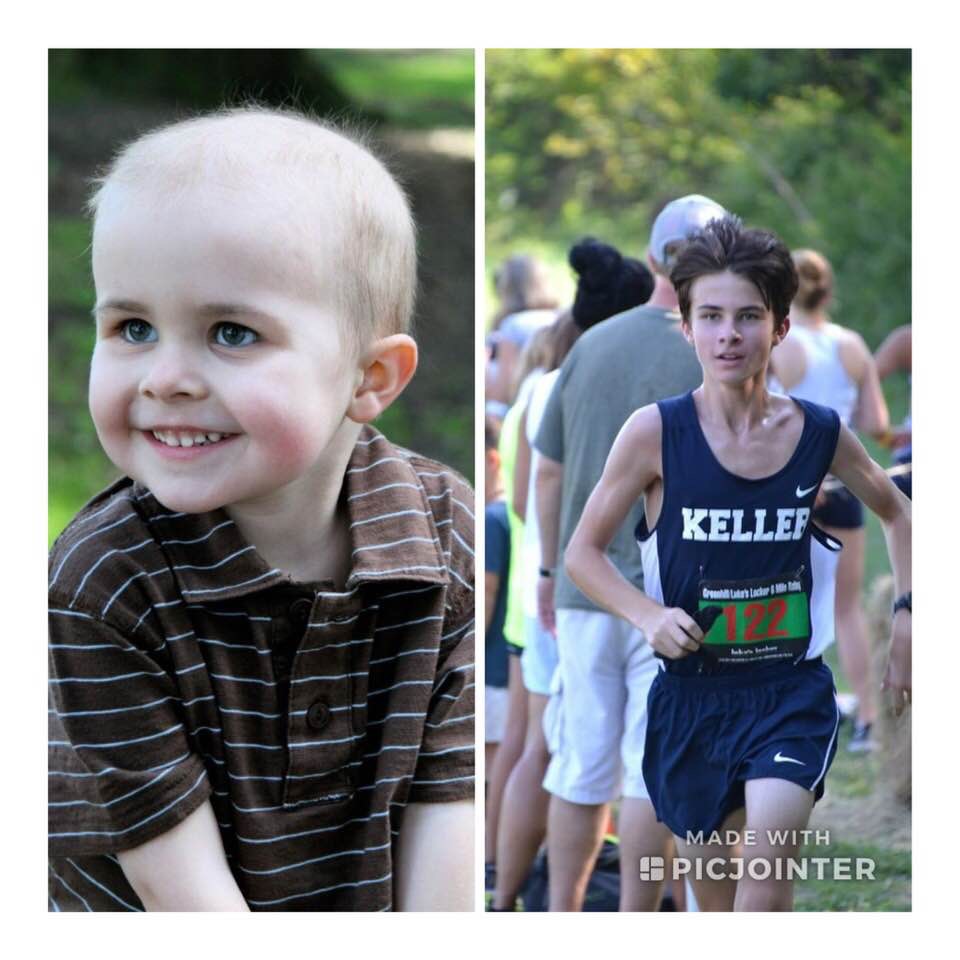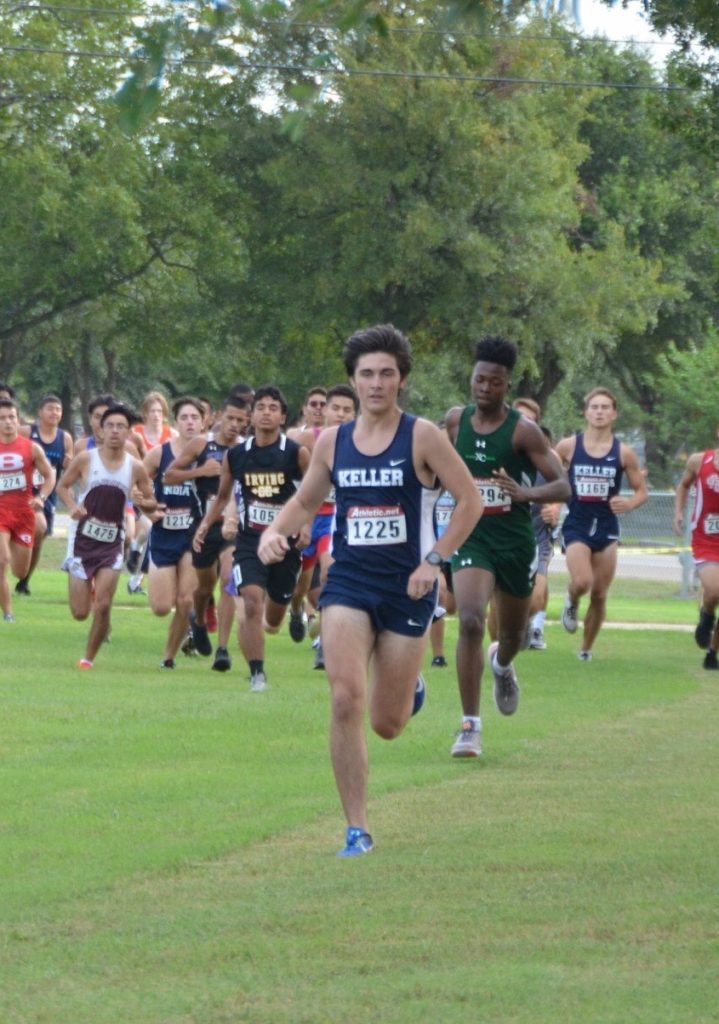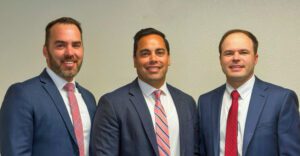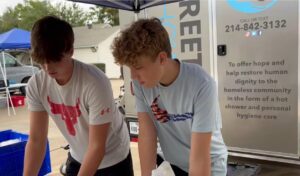Cross-Country Running Brothers Overcome Serious Health Issues
Featured Photo: Seth and Eli Walker at recent track meet. Courtesy of Launi Walker
Brothers, Eli and Seth Walker, from Keller, Texas, have both had difficult health battles to fight, but they have seen blessings and learned lessons together, through faith, perseverance and a determination to keep trying. They both enjoy distance running and compete for their high school in Keller. The brothers are members of The Church of Jesus Christ of Latter-day Saints and both explain how their faith has increased as they have petitioned the Lord over the course of their challenges, neither of which have ended.
When Eli was only three years old, he was diagnosed with Acute Lymphoblastic Leukemia. As a result, he spent the next three years of his life in and out of hospitals in Oregon and Texas, enduring chemotherapy treatments carefully designed to make him better.

A year into therapy, when all had been going as expected, Eli stopped walking. The oncologists ran tests and determined that his cancer had returned and that he would need a bone marrow transplant. Eli’s father, Jonathan, felt inspired to schedule an evaluation at another children’s hospital where they determined not that the cancer had returned, but that Eli had contracted Guillain-Barré Syndrome, a rare neurological side effect of the chemotherapy injected into his spine. The rare condition caused rapid onset paralysis. Within three weeks, Eli was paralyzed in the lower half of his body. His parents were told that whatever mobility he recovered would come slowly. He spent the next eight months in a wheelchair. Jonathan is grateful he had the inspiration to seek a second opinion. “Without the spirit and the guidance of the Lord, this would have had a terrifying outcome,” he explains.
“He was a normal little boy one day, and a paralyzed cancer fighter just a few months later. It was devastating,” remembers his mother, Launi. “One white blood cell divided wrong and his little body didn’t find it until it had made a whole lot of bad copies, clogging up his bone marrow. Like teenagers, these bad white blood cells didn’t have ‘jobs,’ were immature and invincible,” Launi quips, “so they would just hang around making it impossible for his bone marrow to make red blood cells or functioning white cells. Everyday germs were all of a sudden a real threat since these white cells were partying in the bone marrow and not working as they should have been. The body, when working properly, is an amazing machine. Eli’s was fighting on multiple fronts.”
When Eli returned to church with a bald head and a wheelchair, the other kids in his primary class thought he was a new kid who moved into the ward. Once they got used to seeing Eli in this way, many parents commented on how their young children were learning empathy from having Eli in their class.
“Eli was too young to attend school, so church was really his only ‘social’ outing each week,” Launi recalls. “One Sunday, though, Eli wasn’t having it. He was done with sacrament meeting. He was done with his parents. He was four, but he wasn’t walking more than a couple of steps at a time. Somehow, he managed to walk down the row and out the door. At that point, no one was listening to the speaker. Everyone was watching Eli. There was an audible gasp when he made it to the door.”
Jonathan remembers the support of the family’s friends at church. “Eli was given numberless blessings promising him that angels were watching over him and guiding his doctors. We were so grateful for our ward family. They watched our other boys, including our newborn, Gideon, they brought meals, provided rides and comfort. We needed them.”
Because of Eli’s young age, a lot of the physical pain and psychological of regular blood draws and chemotherapy treatments have been forgotten—by him. “I don’t remember much of my cancer treatment, but I do know about the recovery period from the effects of the chemotherapy,” Eli, now 15, says. The oncologist promised Launi and Jonathan that the nightmare would be theirs to bear: a blessing really. A prodigious Matchbox car collection is a reminder of their little boy’s rewards for clinic visits.
The Guillain-Barré symptoms slowly subsided as Eli neared the end of his treatment, in December 2010. Yearly check-ups still show he is cancer-free. However, there have been persistent side effects. Since he spent so many months paralyzed, he has had to undergo physical therapy periodically over the last eight years.
“He had to learn to walk again, to kneel, to stand. But nobody really cared if it didn’t look perfect as he progressed through therapy. We were just so thrilled that he was mobile. Every step was a miracle,” explains Launi, who is a registered nurse.
“When Eli would run, it became very clear that he was using muscles that most of us don’t use,” says his dad, Jonathan. “He uses his hip muscles to compensate for leftover weakness in his calves and ankles. At physical therapy, he works on fixing his cadence and his stance. He’s had to retrain his body. ”
Eli loves running, and he’s highly competitive. He joined the cross country team while at Keller Middle School, and has been running in high school meets this season. “Running is actually a great sport for Eli,” says Launi. “When you’re running cross country, it’s essentially a race against yourself.” Eli has improved his times since the season began last fall and looks forward to every meet. Eli admits:
“It is hard as a teenager to have to fight so hard for what comes easily to others. I sometimes get discouraged. I remind myself that every step is a miracle.”
Eli plans to keep running through high school, “I get better every day,” says Eli, who was recently featured on Texas MileSplit. “I just keep trying. I don’t feel bad about myself if I don’t place very well at meets because I know that I’ve been through a lot. The fact that I’m even running today is good enough for me.”
“Every meet, Eli is racing for a new PR [personal record],” explains Jonathan. “Every step is a blessing.”
“The cancer, the paralysis, it’s all part of who Eli is now. His story is part of him,” says Launi. “I think that somewhere in there, he sees that he is a miracle.”
Eli’s experiences as a childhood cancer survivor have helped him make connections with all sorts of people enduring other hardships. “I have been able to share my story and see many outside of my church family built up by the miracles I have witnessed in my life.” Eli was honored by the Keller High School football team at the end of his treatment back in 2010, when the family was new to Keller. He was one of the “heroes” they honored, which not only made Eli feel amazing, but helped coaches teach the players to be grateful for their blessings. “I have so many people cheering me on because they know how hard I’ve worked to arrive at where I am, even when I finish last in every race.”
When asked what he would tell people who are trying to endure something difficult and come out stronger, Eli says perseverance is important. “You have to keep putting one foot in front of the other, even when it seems like you have a long way to go,” he says. He understands that perseverance can pay off in all aspects of his life: his education, his faith, and his desire to make a difference in the world.
“You just gotta keep working,” Eli says. “I just keep trying. I know the Lord has a plan for me. I can’t wait to find out what it is.”
The first time Eli’s older brother, Seth, who is 18, passed out while running in a cross-country meet was frightening for everyone involved. “I started seeing stars and then I couldn’t see at all. I don’t remember anything after that,” says Seth, a senior at Keller High School. In August of 2017, he was running a 3-mile race in Marcus, Texas. The record shows an official time, but he doesn’t remember crossing the finish line.

Jonathan and Launi were on a different part of the course. When other parents started calling Launi’s phone, she thought that maybe Seth had tripped or collided with another runner, both common occurrences in cross-country races. When she got to the finish line, Seth was sitting with the paramedics with a vacant look in his eyes.
Seth, who was recently featured on Texas MileSplit, had experienced heart palpitations that summer, and earlier that year, he had suffered a concussion. Launi made an appointment with a cardiologist. And a neurologist. At his next race, he wasn’t feeling well, but everything was fine. During the race after that, he passed out again.
“We thought, ‘Maybe it’s his iron levels, maybe it’s his blood pressure,’” Launi remembered. “But all the tests came out negative. We could never figure it out.” Last October, Seth had a heart rate monitor implanted. The doctors thought if they could see what the heart was doing when he passed out, they could identify the problem.
His heart showed no problems when he ran, but a game of pick-up basketball did reveal an issue. Seth was experiencing episodes of superventricular tachycardia, or SVT. This happens when there is an electrical misstep in the heart, and different parts of the heart get out of rhythm. Doctors found the electrical node that was malfunctioning, then cauterized it with heat.
“We thought we were in the clear; we were very excited. Finally, we had some answers,” says Launi. In January of 2019, Seth hit the starting blocks at the Texas A&M High School Indoor Classic in College Station. Three laps in, he passed out.
“I was watching it on MileSplit,” says Jonathan. “I couldn’t see very well, but when I saw that a runner fell, my heart sank.”
Launi, who was there, remembered, “There was an audible gasp in the arena. No one ever falls.” Launi feels like both of her sons’ battles have affected the whole family permanently.
“How could it not?” she says. “Every part of my testimony was touched by the experiences my children have gone through. I’ve seen my faith deepen and my patience, while waiting on the Lord, expand. Revelation became more real and more personal.”
Cardiologists are convinced that his heart isn’t the problem, but Seth’s problems are nowhere near solved. But he keeps running. “It’s hard to silence those worries as I prepare to run at meets,” Seth says. “I just work on keeping a positive mindset and take each lap at a time.”
He has started wearing a pair of signature sunglasses during meets so that he doesn’t alarm the people around him if he starts to lose consciousness. “The first thing to go is my vision,” Seth says. He runs blind. “I can feel it coming on, and can sometimes keep myself from fainting if I slow down. But I just push through it, thinking I can make it, and maybe I’ll pass out at the end. I listen to the people around me, their feet hitting the ground, their breathing. There aren’t lanes in my events; everyone is running in a pack,” he explains.
Seth holds the record at Keller High School for the fastest 2-mile time for a sophomore, at 10:20. He runs a mile in 4:40. This wasn’t what he expected his senior year would be like. He hoped to be contending at districts and at state.
“Sometimes, it’s hard to see the blessings when the answers haven’t come yet.” said Seth. ” This is itself a lesson to learn about how the Lord answers prayers and to trust that the answers will someday come.”
Many throughout the district recognize him as “the kid who passes out.” One spectator asked why they still let him run. “He just loves it,” says his mom. “How can you tell someone they’re done? Running is home for him.”
Jonathan and Launi have two other sons, as well. The boys have all learned lessons from Seth and Eli’s struggles, but “Seth and Eli have seen each other through their health struggles. Eli would watch Seth continue running even when things didn’t go his way. I think he saw that he could keep running even when it was hard,” says Jonathan.
“I’m really proud of him,” says his dad. “He puts in a lot of effort during the week and refuses to give up. He shows a lot of perseverance. As a father, I don’t want to see them experience these challenges that seem to prevent them from reaching their potential. Then I realize that they are achieving their potential in other qualities. They aren’t just exercising their muscles, they are exercising their patience, their perseverance, and their willingness to overcome challenges. I am proud of the fact that they are becoming better people as well as better athletes.” Seth will graduate from Keller High School in May, and though he has committed to attend Utah State University, first he will spend two years as a missionary for his church in Fort Lauderdale, Florida. He’ll be learning and teaching in Spanish starting at the end of July.
“I look forward to serving a mission and hopefully, the answers to my prayers will come as I try running for Utah State when I return. Coach always said, ‘You can’t fake the grind,’” says Seth. So he keeps running. “I hope that someday I’ll be able to run my race. I’ll be ready.”







